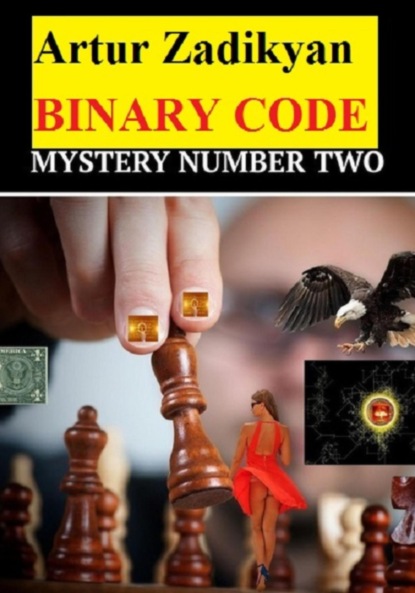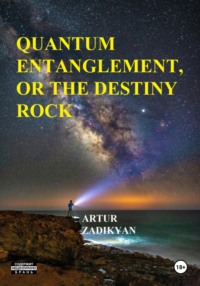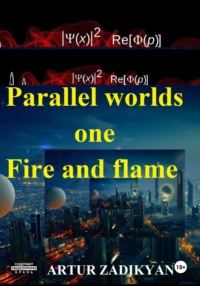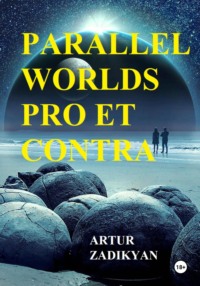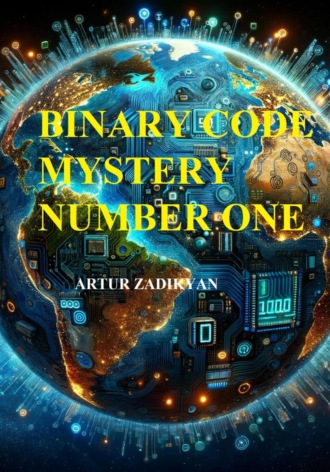
Полная версия
Binary code: Mystery number one
Those gathered continued to listen intently.
– Here's another similar incident. Once at 8:50 a.m. computers in three U.S. command centers at once – in NORAD, in the Pentagon and in the Reserve Command Center in Maryland – sounded the alarm: "The United States has been subjected to a massive nuclear strike by the USSR. For the next six minutes, the fate of the world was decided. A Threat Assessment Commission consisting of senior officers from all three centers was immediately convened. ICBM launch sites received advance warning of the strike and instructions to prepare a retaliatory strike. Ten fighter-interceptors took to the air on alert, while others prepared for immediate departure. A so-called "doomsday plane" even took to the air, intended for the high command and the president, who would be able to command troops even if all ground command centers were destroyed.
The Threat Assessment Commission worked quickly and smoothly: all reports were cross-checked and data from long-range radar stations and space satellites were received, none of which confirmed the launch of even one Soviet missile. The system was rebooted and the alarm was declared false. The investigation revealed that the cause of the false alarm was a mistake by an Air Force command center officer who ran a training program simulating a full-scale Soviet attack on a computer included in the NORAD unified command system, which caused the general alarm. This possibility was later eliminated by physically separating the training and combat systems.
Yuri Vasilyevich spoke without stopping, confidently and clearly.
– Another similar case, again related to the NORAD center. One day, in the middle of the night, the computers of the Strategic Air Command and the Pentagon received messages from this center about the launch of missiles on U.S. territory. The counter of launched missiles suddenly changed its value and began to show 002 or 200 attacking missiles. The duty officers were alarmed, and an alert was declared. Pilots took their places in the bombers, the engines were started, the launching points of missiles "Minuteman" received instructions for a retaliatory strike. Minutes counted. A decision from the Risk Assessment Commission was required to launch a retaliatory attack. And the counter continued to go crazy – the "zeros" and "twos" kept changing places. This raised doubts about its serviceability. Then the control messages from the early detection stations were checked, which showed no threat. The alarm was canceled and the counter was reset. Three days later, the situation was exactly the same, and then the Commission was able to find the cause – it was a defective microchip in the computer system NORAD, costing only 46 cents, which arbitrarily changed the values of the counter because of a failure in its own electronic circuit. So a penny electronics could have destroyed the entire humanity… The point of my digression is to emphasize once again that the world is fragile, people are emotional, computer systems are imperfect.
There was another case on the subject of the nuclear suitcase. It was 1991, during Yeltsin's hunting trip to Zavidovo near Moscow. When we were sailing on a boat on the lake, one foreign guest kept looking at a black suitcase at the bottom of the boat. He thought it was nuclear. He tried to stay away from the suitcase, trying to sit on the edge of the boat. When they opened the suitcase on the island and took out two bottles of vodka and pickles, the guest laughed for a long time.
Some of the staff, hearing the story for the first time, chuckled. The colonel was silent for a moment and continued:
The F Division officer, a thin man with a shrewd eye, raised his hand, gesturing that he wanted to ask a question. The chief looked at him, nodded his head.
– So it's already been signaled to attack from us, but without us? – he asked worriedly.
– Maybe," Zhidkov replied, giving him a leering look.
– Can't you ask the supreme commander-in-chief? – he continued.
– That's the interesting part. Who is the supreme commander in chief? Where does the initial order to open the bags of pre-posted orders come from?
Ruthra realized that the chief was asking questions to which he knew the answers. "Do the others know this manner of Zhidkov's dialog?" – he thought.
– What about the signal to stop the combat algorithm? – The "F" department officer did not stop.
– Let's say it hasn't been received yet.
– What's stopping you from giving it away?
– How? Who? What if the supreme leader doesn't give the order when he should? Or if he can't? And how do we know when it's the right time? It is understandable if missiles are flying, but what if it is a regular war and we are losing? We could not, so to speak, "stop at Stalingrad"? Let's say Moscow is already surrendered. What then? Who will give the order? And who decides that it's time? You can't reveal all the parameters of the system. Everyone involved in the investigation will know their part. So, among other things, the task is to give inaccurate information, false in some places, but so that it coincides with the parameters of the truth.
Everyone in the audience was silent, listening without question.
– All information is held in detail by Rutra Tigrovic.
Ruthra nodded in agreement. He knew it all by heart.
– I will only add that many enterprises and organizations of various ministries and departments took part in the creation of the complex," Vasilyevich continued. – You will have to work closely with them. In the Western press, the system has earned the name "dead hand". No matter how much you hide it, information still leaks out. The games of professionals.
After these words, the head of department "P" could not stand it. Without asking permission, he said angrily:
– Why is it leaking if it's so official?
– Yeah, but they're not stupid, either. You don't think they'd believe it, even if it was a general. They know it for a fact," Zhidkov replied calmly, not indignant, realizing the awkwardness of the situation, and continued: – "None of the uninitiated would have known about the existence of the Perimeter if one of its developers had not fled to the United States, where he exchanged information about the system for an American passport. In October 1993, The New York Times, an influential newspaper, ran a panicked article under the headline "Russia Has a Doomsday Machine". Another of Perimeter's developers admitted that he knew of no reliable way to disable the system. The control and command system, its sensors and missiles are designed to operate under nuclear attack.
– He "escaped" on purpose," the general did not calm down.
Vasilievich pretended not to notice that he had been interrupted and continued the story:
– Remember the most important thing. In peacetime, Perimeter is in a calm state, "dozing", but it does not stop analyzing incoming information. When it goes into combat mode or receives an alarm signal, it starts monitoring the sensor network to detect signs of nuclear explosions. Don't forget the basis of the system's operation – before launching a retaliatory strike algorithm, Perimeter checks for four conditions. First, a nuclear attack has occurred. Then it checks if there is communication with the General Staff. If there is communication, the system is shut down. If the General Staff does not respond, Perimeter requests Kazbek. If there is silence there, the artificial intelligence transfers the right to make a decision to any person in the command bunker. And only after that it starts to act. That's all for understanding the essence of the problem at hand. I should add: don't forget what kind of organization we are, here, in the system we have chosen and which has chosen us, there is no traditional concept of "one's own – another's". This imposes certain difficulties, although everywhere the doors are open to us, including the "probable enemy". By the way, the "likely adversary," NATO, has called the creation of a nuclear strike system that operates without human command immoral.
Ivashov joined the dialog again, without being asked.
– They have everything immoral if they can't control it. They've forgotten that this is a retaliatory system. So they consider a first strike, from them, not immoral! Meanwhile, the US has a similar complex.
Zhidkov did not respond to this in any way, looked around at those present carefully and added:
– In general, the essence of the problem is clear. I think everyone is well aware of what can happen if the system gets out of control. It's a matter of life or death. I am not exaggerating, take it seriously and don't forget that you need to think outside the box. All possible checks, investigations have been done. I will only add that, in my intuitive experience, you need to look where there is information not publicized, even to those who directly operate the system. Keeps it running, so to speak.
Having said that, the head of the center looked at the head of the "P" department, who was going through the documents from the "Perimeter" folder. He was obviously looking for something. Zhidkov added:
– Most importantly, the weapon of assured retaliation includes not only a nuclear missile component, but also what is encoded in the word "perimeter."
Vasilievich stopped talking for a few seconds, turned a page on a tablet built into the desk, then announced that he had received an assignment to prepare public opinion for the necessity of destroying weapons of mass destruction.
– We need to prepare society. It is necessary to make people believe that a catastrophe of planetary scale may occur, one of the variants of which may be a nuclear apocalypse. The possibility of catastrophe must be presented as quite real. If they believe in it, if they associate it with weapons of mass destruction, then it is easier to prepare them for its destruction. Then those who would vehemently resist it would become markers that could possibly put us on the trail. That's one option. Such etching methods have to be resorted to because, as I said, all traditional methods have been tried. The public loves predictions, so it's not hard to prepare them.
The young ladies, who, for all their seriousness, were taking a non-serious view of what was going on, which was evident from their detached gaze, became a little animated.
– Is there something you want to ask me? – Zhidkov turned to them.
They hesitated for a moment. The situation was saved by the head of the molecular genetics department.
– And Putin? – She asked.
– Putin was familiarized with this system, which gave him the right to say: "The Americans have walled themselves off with a puddle and feel safe for nothing! A nuclear attack on Russia would be the end of the world," Zhidkov replied nonchalantly. – Any questions? I think not. Don't forget the main activity. On the agenda is an update of additional parameters on each citizen of the earth. Please continue the meeting without me. Tomorrow we'll discuss the prepared options. Rutra Tigrovich – get used to it.
Saying the last, the chief left the hall.
Chapter 9. Risks of human extinction

– Who has thoughts, suggestions on the subject, where to look and what to look for? – Rutra asked those present.
– My assumption is that we should not look for a secret source, but an obvious one," said the F Division officer.
– More precisely.
– Yuri Vasilyevich touched on the need for the complete elimination of nuclear weapons. With the current level of top-secret weapons, this is quite realistic. I do not mean physically, but as a means of defense for highly developed countries, which are the main nuclear powers. That is, they can afford it without compromising their defense capabilities. There is something to replace them with. But how? How to present it to the people? If we reveal the secret about the available means of influence on people, there is a high probability that it will be perceived that these means can be used not only against enemies. That is, against our own people as well. For example, a psychotropic bomb.
– Be specific," Ruthra asked calmly.
– The point is that the search method manual has clear instructions that are not about search methodology. It is to prepare the public opinion that the catastrophe threatening the demise of mankind is very real.
No one was friends with the "F" department, because they were withdrawn, taciturn people. Therefore, no one asked questions or entered into a discussion, which was customary at Zero meetings.
– Say what you want to say," Ruthra demanded.
– I do not want to say that we have not been told something, but I just want to suggest that, since this is required by the program of action, the following information should be disseminated in the media. Over time, people have apparently forgotten that once the apocalypse on a global scale was discussed quite seriously.
– What exactly? – Ruthra asked.
– Now. I do not insist on this particular option, I only want to suggest that such a thing should take hold of people's minds. Then, perhaps, the one who is up to something will take certain steps and make a mark. That is, we can calculate him, so to speak, by markers.
– I see your point. You think people will take this seriously?
– Depends on who's presenting it. Let me read the material, then I'll share my thoughts.
Ruthra glanced over to the staff. Some, mostly young, expressed curiosity, while the older ones, the "veteran group," expressed skepticism.
– So, listen. I think many people will be surprised that this has been discussed at a serious scientific level.
– Come on! – Ruthra couldn't take it anymore.
– Smith, in his book The End of the World Men, describes the history of how the cobalt bomb was first proposed in this way. I will cite some excerpts. "You may ask," Scillard said, anticipating his critics, "who would want to kill everyone on earth? Any country that wants to be invincible in war." "Let's suppose," he explained, "that we are engaged in a war and are on the verge of winning a war with Russia that has lasted, say, ten years. The Russians might say, 'You will not go beyond this border, or we will detonate our hydrogen bombs and kill everyone.'" Faced with that kind of threat, I don't think we can continue. I think Russia will be invincible." In a public lecture the following month, Brown told the audience that he was now convinced that there were people who were prepared to destroy all life on Earth if they did not get their way. The only ray of hope remains that "those who would want to use these weapons to kill must accept suicide as a condition of the deal."
The F employee was quiet for a moment and added:
– That's what I suggest we put on the air.
The hall was silent, digesting what they had heard.
– Any other thoughts? – Ruthra asked in his superior capacity.
The hall was silent, many were writing something down.
The head of the demography department raised her hand. At the same time, the same F department employee offered:
– If there are no objections, I can continue.
Ruthra wanted to already give the word to Madame that she had raised her hand, however, she asked politely:
– Uh, no, no. Can I go after him?
– What else you got? – Ruthra turned to the man who had suggested he continue.
– If that's the case, the logical thing to do is the following," he said. – We need to get people to think about it, to make them realize that it could happen. We need to use everything: lectures, movies, music, talk shows, politicians, scientists, military. You have to give examples and constantly scare them. I will tell you, give examples, what information and how you can use it. Attitudes toward the problem of human extinction depend largely on an individual's belief in life after death, ideas about the value of the human race. Human extinction is part of many people's belief in the sense that the end of the world means the absolute end of their earthly existence but not of their eternal soul. Some religions allow for cyclical regeneration. However, most religions do not associate the end of the world with human extinction, since the end of the world means in reality the beginning of a new way of existence, with the Christian religion saying that after the end of the world, all humans who have ever lived will live forever with their bodies, but elsewhere. However, there are the following reasons why the risk of extinction of humanity is not obvious: throughout history there have been countless predictions of human extinction. In all cases, the predicted end-of-the-world date has passed without any consequences, making subsequent warnings less frightening. There are thousands of public safety jobs dedicated to analyzing and reducing the risks of individual death. Yet there is not a single person dedicated to human extinction risks working full time, in part because there is no way to know if they are doing their job well. Pondering human extinction has become unfashionable. Denialism is a kind of negative availability heuristic that occurs when the outcome of events is so unpleasant that even the very act of thinking about them leads to a growing reluctance to believe that such a thing could happen. This leads to an underestimation of the likelihood of human extinction. In general, humanity's sense of self-preservation and intelligence is seen as a strong defense against extinction. It is believed that people will find creative solutions to overcome potential threats and will use the precautionary principle when undertaking dangerous endeavors.
The member of the "F" department, pondering something was silent, and then continued again:
– The arguments against this are as follows. First, managing potentially disruptive technologies is becoming increasingly difficult. Second, the precautionary principle is often discarded when the rewards seem to outweigh the risks. One example of the precautionary principle being discarded already exists: before the detonation of the first Trinity atomic bomb, one of the scientists involved in the project, Edward Teller, suggested that a nuclear reaction could destroy the entire state of New Mexico and perhaps even the entire world by causing a nitrogen fusion reaction in the atmosphere. Hans Bethe's calculations proved that this was impossible, but anxiety remained until the moment of testing. Various scenarios of human extinction come from science, popular culture, science fiction, and religion. Humans are probably the only species that has a conscious awareness of its future demise, likely to take steps to avoid it
Many examples could be given. I think that's enough to start with. I have no other suggestions for now.
With these words the specialist of department "F" finished his speech, listening to whom outsiders would understand why this department in "Zero" is called "the department of fantasists".
– You have something, am I reading that right? – Rutra asked the person in charge of world demography.
– May I?
– We must! – Ruthra motivated her. – Don't forget that all traditional methods have been tried.
– Can I start? – She asked.
– We are listening to you," Ruthra replied.
– I have an article.
– Familiarize us with her," Ruthra asked.
– Reporting," she said in an accent of uncertain origin.
It was clear that she had come to Zero from the security services, the SVR or some similar foreign service. Rutra did not yet have access to the initial employee profiles.
– My article touches on such a topic as World War III. It is an event that many believe cannot happen because of its fundamental insanity. But I think it is quite realistic.
What do we put into the meaning of the expression World War III? World War III is first of all a global military conflict. In case of massive use of nuclear weapons in the Third World War, most of humanity may be destroyed. According to experts of the UN Commission, the total stockpile of nuclear weapons is about 10 gigatons in TNT equivalent. According to the estimates of the international journal of the Swedish Academy of Sciences, dropping 5000 nuclear shells with a total capacity of two gigatons on the main cities of the northern hemisphere could lead to the simultaneous death of 750 million people from only one of the striking factors – the shock wave. Thus, according to scientists' estimates, the nuclear arsenal of mankind is sufficient for its complete extermination. Literature and cinematography often play up the possibility of the defense system going out of control of the country's political leadership or an irresponsible leader coming to power, which leads to mutual destruction of opponents, despite the practical senselessness of such a strategic decision. The consequences of nuclear war could theoretically lead to catastrophic changes in the climate and environmental conditions of the planet. This view has largely defined nuclear weapons as weapons of strategic deterrence of opponents from the outbreak of nuclear conflict. At the beginning of the 21st century, the main points of tension are on the borders between Pakistan and India, and Israel and Palestine. On the side of the latter is Iran. The Indo-Pakistani conflict has escalated in the early 21st century because both states have received nuclear weapons from their patrons and are actively building up their military power. Today, military supplies to Pakistan are provided by the United States, and arms supplies to India are provided by Russia, but at the same time Pakistan is showing increased interest in possible military-technical cooperation with Russia, and the United States is making attempts to oust Russia from the Indian arms market. The situation around the Arab-Israeli conflict is similar: the United States is an ally of Israel, while Arab states traditionally buy weapons from Russia. If the Arab-Israeli conflict develops to the level of war, a direct or indirect confrontation between the nuclear powers – the United States and Russia – may arise. We don't even have to make up scary stories, I think it is enough to emphasize the statements of well-known politicians on this problem. For example, the former U.S. presidential candidate, "the situation in Crimea is part of the whole scenario, that is, the scenario of the Third World War." Or the first president, "Putin could be the initiator of World War III." And one of the party leaders in Russia, who likes to shake the air, said that Russia is being prepared for a big war, as the decision to start World War III has already been made.
The very article I am proposing can be discussed on some popular forum or on an analysis program on television.
She was silent. Ruthra realized that the speech was over.
– Do you have everything? – He asked.
– Yeah, I guess so.
– Who else would like to speak? Any suggestions? – Ruthra asked the audience.
No one answered.
– Most importantly, don't forget that people do what they think and fear what they think. I think it has become clear to you that the media work is the first part of the project. There will be other parts going on in parallel. Depending on what results the first part brings, the other parts will be adjusted. If there are no further proposals, this meeting is adjourned," Rutra announced.
Chapter 10. The media as a means of mass hysteria

In the months following the Zero meeting, the airwaves were bombarded with programs on similar topics. It became fashionable to understand such issues. Speeches of experts from Russia, the United States and Israel occupied a special place, as they were broadcasted directly. Talk shows, news and speeches of different levels of specialists became the main topic of the media. Central channels tried not to stoop to the level of "occult sciences" and "great predictions", which were fantasized on the airwaves and pages of various fashionable "heralds of truth".
The propaganda and censorship department at Zero monitored all possible media. Computer programs, according to a special algorithm that could be changed depending on the requirements, marked with special markers and gave to the operators for analysis exactly those copies that were of interest to the "customer". Rutra was periodically provided with the materials, in the assessment of which the analysts' opinions differed. In contrast to all official services that monitored the content of the airwaves and the flow of information, Zero's function was to monitor these services, the quality of their work, and to shape public opinion with their help.



